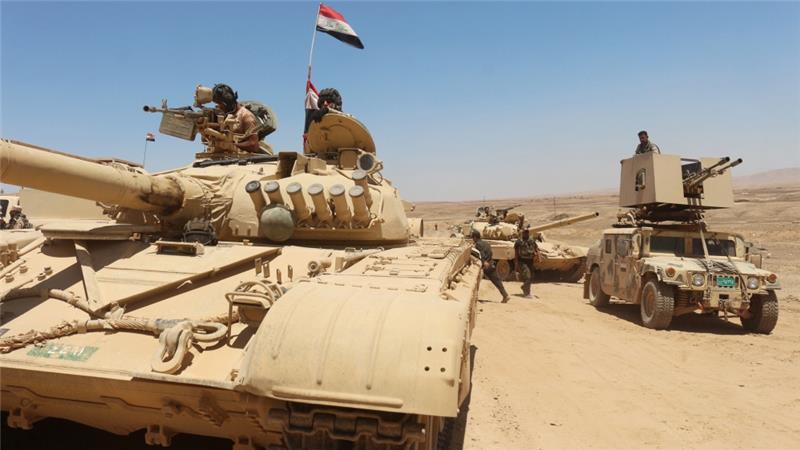(AhlulBayt News Agency) - The operation to liberate the northern Iraqi city of Mosul from ISIS terrorist group has started on October 17, 2016. In the beginning, the Iraqi army forces made remarkable advances from the southern neighborhoods of the city, as at the same time the Kurdish Peshmerga forces, deployed from the Kurdistan region, were cleansing the northern parts of Mosul from ISIS terrorists.
Since the initial days of the anti-terror Mosul assault, the struggle to liberate the central districts of the city started by the Iraqi military and counterterrorism forces. After three months of the liberation campaign, the eastern regions of Mosul were finally recaptured fully from the terrorists on January 17. In fact, after three months the eastern side of Mosul, which is a major part of the city, was entirely cleansed of ISIS forces.
A statement issued by the Iraqi Counter-Terrorism Service (ICTS)has confirmed full reclaiming of east of Mosul, adding that short time after the fresh achievement, the joint Iraqi forces will move ahead to take control of western Mosul in a bid to pave the way for retaking the whole city.
Following the ICTS’s statement, the zero hour for liberation of western areas of Mosul was announced, however, the exact date of the start of operation was not revealed. Many analysts maintained that recapture of Mosul’s west will be much more strenuous than liberation of the east, and so a long-term outlook should be imagined for conclusion of the upcoming stage of Mosul reclaiming operation. What barriers lie ahead of the push to free Mosul’s west from the grasp of the terrorist group? To answer this question, we need to highlight two major hurdles that will follow:
1. Inconsistent population composition and high population density
According to the ICTS’s statement published on January 17, one of the key issues that has been highlighted and emphasized on is “protecting the human rights and dignity during Mosul liberating campaign". The statement argues that during the three months of operation the citizens in the ISIS-held city sustained the least possible harms as the assault advanced. The consideration of safety of the civilians came against the backdrop of an assault that so far killed over 3,300 ISIS terrorists to retake eastern Mosul, according to General Talib Shaghati, the chief of Iraqi anti-terror service. General Shaghati added that 300 suicide vehicles were identified and disposed during the operation. What should be taken into account is the fact that, western Mosul, in comparison to east, has a higher population density, and even according to the reports, a major part of staunch pro-ISIS population is living in this side of the city, which is capital of Nineveh province. Moreover, the western neighborhoods of Mosul are more demographically inconsistent than the east. The region hosts a diverse population of Sunni Arabs, Turkmen, and Kurds. A combination of these issues stands as a serious impediment ahead of a fast progress of the Iraqi army and counterterrorism forces.
This issue pushed the American forces to immediately after liberation of the east of the city take under control the Gogjeli, Quds, Saddam, and Zehour districts of eastern Mosul to take shelter in them. The reports have suggested that due to population-related complexity of western Mosul, they are designing new schemes to get back control of east of Iraq’s second-largest city. Essentially, liberation of Mosul’s west can bring forth an array of troubles for the Iraqi political leaders because up to now during the operation inside the city 26,806 families or about 160,000 people were displaced. 74 percent of the refugees are kept in the refugee camps. 14 percent are stationed in makeshift refugee houses, 11 percent are hosted in places designated by the rescue organizations, and 1 percent is still living in the rubbles. Such critical settlement conditions urge the Baghdad political leaders to take more serious measures to address the displacement especially that the population density in the west is high and it is likely that the number of the homeless people will hit over 500,000.
2. Destruction of access routes in western Mosul
Another blockade ahead of western Mosul recapture campaign or even a full control of the city comes as a result of demolition of bridges and roads by US airstrikes. In past few months, the air raids of the anti-ISIS alliance destroyed a series of bridges on the Tigris River. This demolition can set up real difficulties ahead of the advancing Iraqi forces. The progress is likely to seriously slacken because of lack of proper access routes. This means that liberation of this part of Mosul will be slowed down. The problem is even doubled as we know that the ISIS forces, standing on the other side of the river, will disrupt any effort to build new or reconstruct the destroyed bridges by the Iraqi forces. Therefore, it is likely that the campaign for reclaiming west of Mosul will be an erosive process.
/298
source : Alwaght
Saturday
21 January 2017
10:42:32 AM
806301

Many analysts maintained that recapture of Mosul’s west will be much more strenuous than liberation of the east. What barriers lie ahead of the push to free Mosul’s west from the grasp of the terrorist group?
